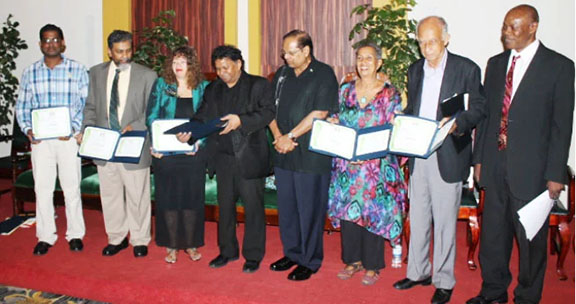It has been four years since the Guyana Prize for Literature was last awarded and members of the literary community have begun to despair that the Prize will ever be resurrected.
The widely hailed Prize was the brainchild of the late President, Desmond Hoyte.
Ruel Johnson, who won the prize for best first fiction manuscript in 2002, has described the APNU+AFC government’s actions in relation to the prize as the low-point in a pattern of decimation of culture.
“There has been a deliberate policy of cultural initiatives being put on a treadmill at best, and for purely partisan political reasons. The result has been the actual loss to Guyana of millions of US dollars in aid, and that is merely the monetary cost – the larger intangible cost has been widespread and incalculable,” Johnson lamented in a Facebook post on the issue.
Similar sentiments were expressed by the longtime Secretary of the Prize’s Management Council Al Creighton.
Writing on the prize in his weekly arts column published in the last Sunday Stabroek, Creighton declared that “it is inconceivable that this priceless institution should be shut down.”
He noted that as it stands today, the Guyana Prize has been discontinued.
“Applications were made, there was a stakeholder consultation at the Theatre Guild, recommendations were made, but funds have not been released to allow its continuation, and there is no word on when or whether that will happen,” Creighton lamented.
He described the Guyana Prize as one of two distinct advantages Guyana has developed in the field of culture and the arts stating that it has been the pride (and envy) of the Caribbean, winning praise, respect and international image for the nation while playing a valued role in the development of their respective fields in Guyana.
Creighton explained that the Prize is one of only two in the world which trains writers or assists the beginners. The other is the Commonwealth Foundation, which runs the Commonwealth Writers Prizes.
The inaugural Guyana Prize in 1987, he noted, offered only one prize for Best First Book, and both fiction and poetry had to compete for it.
“This shows the original orientation, which did not put the emphasis on upcoming, developing new writers. It was about the established. It was after further deliberation that the prize was split and there was one each for Best First Book of Poetry and Best First Book of Fiction,” he shared.
He further indicated that the Management Committee, who Guyanese curse, has been responsible for immeasurable progress and advancements in the Prize over the past years, making it much more multifunctional and helpful to local Guyanese writers than it was in its early years. There have been continuing series of innovations and revisions that took it to where it is now before it was stopped.
According to Creighton, the committee realised that several things had to be done if good writing was to be promoted and writers were to be assisted in producing it therefore the rules were changed to allow self-published or privately published works to be entered.
“This was further expanded to make unpublished manuscripts eligible for entry. It was decided that writers who live in Guyana could enter manuscripts while those living overseas had to enter published works,” he said.
It was explained that the committee took on the responsibility of promoting Guyanese literature and writers at Carifesta (and locally) by joining with the University of Guyana Library to mount the largest and most impressive exhibitions of literature ever seen in Carifesta. Then the next move was made to do even better. The unprecedented step was taken to take writers – Guyana Prize Winners – to Carifesta to show their work so they could gain exposure.
Training of writers
Training of writers was, Creighton explained, seen as essential by the committee, although that is not a task undertaken by any literary prize.
In the context of a developing country like Guyana this was thought to be an important area of help to emerging writers. The Guyana Prize has a long history of writers’ workshops, and at one time these were conducted by members of the Jury when they visited. However, this practice was not found to be sufficiently frequent and had to be done in short sessions which were insufficient, he noted.
Additionally the Department of Culture in Guyana established the Institute of Creative Arts and one of the visions was to have a School of Creative Writing which proved a bit difficult to realise, so the Director of Culture collaborated with the Guyana Prize and found a solution to the problem of insufficient workshops.
Creighton as the Director of the National School of Theatre Arts and Drama (NSTAD) was asked to inaugurate formal certified training in Creative Writing and set up a Diploma in Creative Writing as a more viable substitute for occasional workshops by the Guyana Prize.
This programme started in the 2016 /2017 academic year and has so far graduated 11 writers with the ICA Diploma. It is the first time in Guyana’s history that formal certified programmes in Creative Writing are in existence.
Up to February this year, Minister of Social Cohesion, Dr. George Norton, who also has responsibility for the Department of Culture, Youth and Sport, told Stabroek News that a decision on the future of the Guyana Prize was at the level of the ministerial plenary which was then performing the functions of Cabinet.
He had indicated then that it was intended that a presentation would be made to Cabinet but a resource person involved in the report, whose presence was considered essential, was overseas-based and, therefore, the presentation had been delayed. No further word has been heard since from the government on the Prize.






